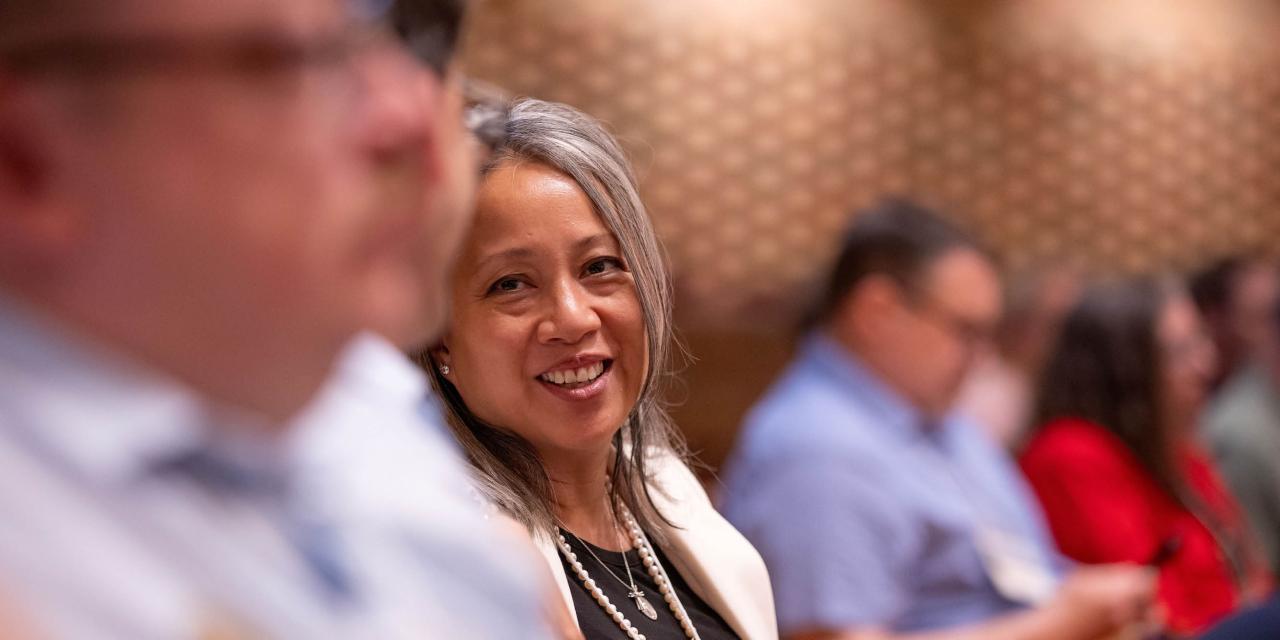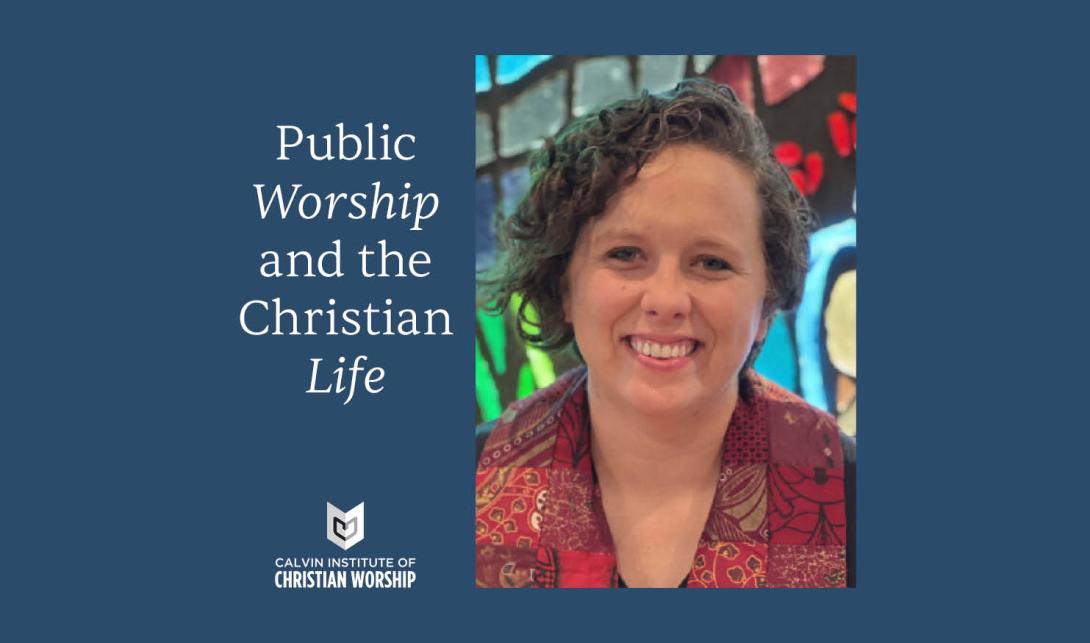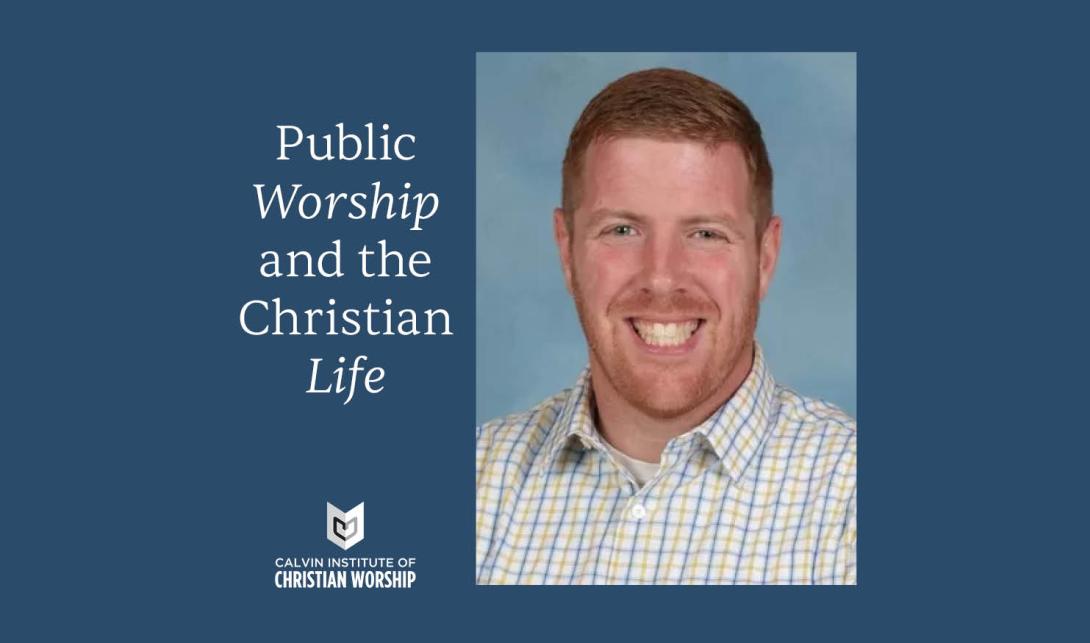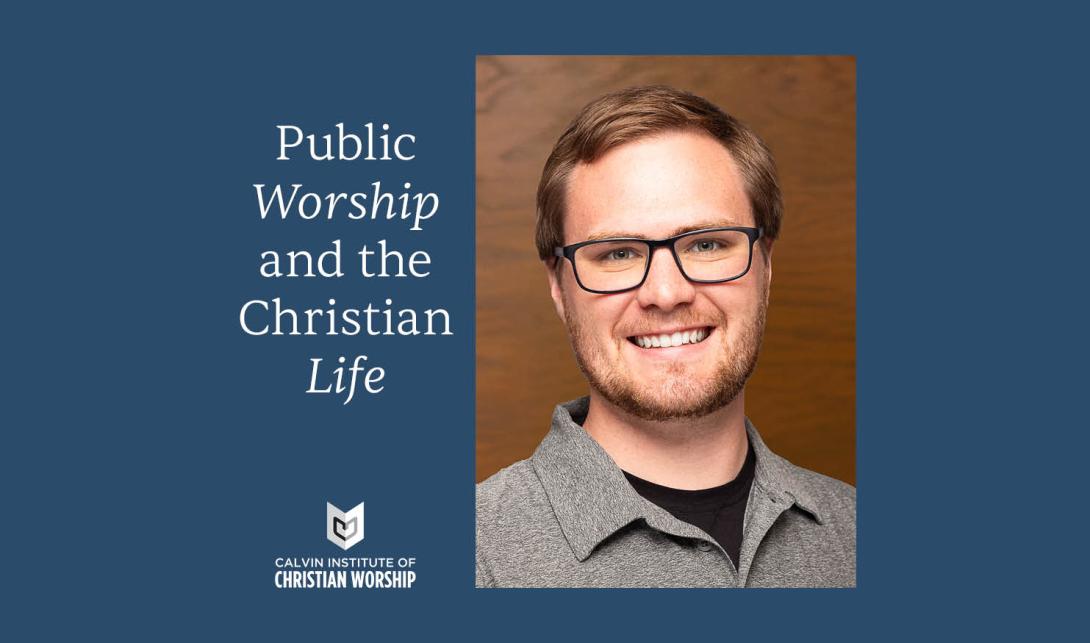Episode Transcript:
LaVerne Tolbert 00:06
Parents need the church more than ever. And I think we have to be more creative and find ways to make this partnership really viable so that parents feel confident, they feel supported. They feel that the church is key and instrumental in what is going on in the home.
Kristen Verhulst 00:34
I'm Kristen Verhulst, your host of this episode of Public Worship and the Christian Life, a podcast by the Calvin Institute of Christian Worship. Find us at worship.calvin.edu.
LaVerne Tolbert, I am so delighted to talk with you again, to see you again. Welcome to the podcast today.
LaVerne Tolbert 01:04
Thank you. It's an honor to be here, and I'm so delighted to see you again as well.
Kristen Verhulst 01:09
For all of you listening, Dr. LaVerne Tolbert is president of Teaching Like Jesus Ministries, a parachurch ministry named after her book Teaching Like Jesus: A Practical Guide to Christian Education in Your Church. This book now has been out for several years and I'm delighted that it's been picked up in colleges and seminaries throughout the United States, and really those seminary students, as Dr. Tolbert talks about, were the inspiration for writing that book. And LaVerne is also the vice president of editorial for Urban Ministries, Inc. This is the leading African-American Christian publisher, which provides media, books, and curriculum for churches all across the United States and beyond. And these ministries dig deeply into Dr. Tolbert’s passion, which is to equip leaders in the local church and to inspire others to want to engage this important work. So, LaVerne, you've been doing this for many years now, the ministry where you're teaching; you've written many books and articles. What have you been learning about this important work of faith formation and church life?
LaVerne Tolbert 02:28
Oh, my goodness, Kristen, what a question, because there is so much that I have learned. First of all, change. Over the past few years and certainly decades, so much has changed in the church with the way we teach, with the way we learn, with our congregants, with their preferences. And it is a challenge for many churches to kind of keep in step with the changes in our culture and the changes in our families and our homes. And so I think that is the biggest challenge, because we want to stay where we are. We want to get a routine. We want to get an answer. We want to get a way of doing things that works. And for some time, it does. But when it changes, the church has difficulty making that adjustment.
Kristen Verhulst 03:29
And of course this pandemic. Coming out of the pandemic has also brought so much change that for some people, it just was too much to deal with. And of course, faith formation at home and at church have all kinds of ways they dovetail and come together. And our work here at the Worship Institute, of course, focuses on the public worship gathering. But we know so much important work about faith and spiritual development happens in the home. So I wonder if you can take some of that learning that you've done in your ministry work and reflect with us about some of the practices that you see, especially when you think about young children in an intergenerational community that has encouraged those young children growing in the faith to be full, active, eager participants in worship.
LaVerne Tolbert 04:29
What an excellent question, Kristen. And yes, I agree that the COVID pandemic was devastating, and it shocked and changed everything about ministry and especially for children. And of course for the past three years, children were excluded from attending church. Although adults were learning online, there were few opportunities for children to be ministered to online. And so these formative years for them with catechism or religious instruction is so, so essential to the faith, they were not learning, and they were not in church. Unfortunately, post-pandemic, if we can say it's post-pandemic, children are still absent from churches. We're not seeing the return of families and children that we experienced before the pandemic. And so I think what this means in terms of intergenerational worship, I think once again we have another challenge for the church, because intergenerational worship is parents and grandparents and children all worshiping together in the sanctuary, singing praise songs, listening to the Word of God, and celebrating Christ together. Well, with church attendance dwindling, how is that happening in our churches today? Unfortunately, the answer is: it's not happening very, very well. We have a challenge of including children into the service without boring them. Children have very short attention spans. Their parents are often in church with their children. But, you know, after five, ten, fifteen minutes, the children become restless and then parents are distracted with entertaining their children and listening to the worship service and being involved. And so this presents a challenge. And these are the very reasons that churches decades ago started taking children out of the service and putting them in their own classes, which were targeting their individual age development. Now that we realize that, well, children want to, they need to see examples of adults worshiping. They need to see their parents worshiping. They need to see other adults celebrating Christ. Because when they become teenagers, and all of a sudden they're back in the church, there's a disconnect. And I know in my personal experience, I grew up in church. Of course, we had Sunday school, but I remember watching my dad—my dad was my pastor—preach and teach and sing and worship together. And those are some of the most wonderful memories that I have that were instrumental to my faith. When children don't have that, we are challenged with getting the Word of God and getting families equipped so that they can teach. And that's the challenge. I don't want to prolong the question.
Kristen Verhulst 07:45
It's a challenge and an opportunity that involves careful consideration and planning by all the leaders as we think about bringing people back together post-pandemic. Are there new ways that older adults with a lot of wisdom might be encouraged to look out for or to reach down to the younger generation? I don't know. Do you see ways in which different generations could come together even as we're coming out of the pandemic? It may be in ways that we didn't consider before the pandemic that now seem even more urgent or possible.
LaVerne Tolbert 08:26
I think of the ways we learn. So we're either visual learners, meaning that we like to see things or PowerPoints, we like to see things in writing, we like to read; or we're audio learners, meaning that we prefer to hear and speak. Or we’re kinesthetic learners; we want to do something. So if we target the way people learn and think about the way we like to learn, this is a great opportunity for older adults in church, for adults in church, to teach their children First of all, our worship service: In many churches, we have screens. We have those large video screens, which is an opportunity not just to put the words and songs up there, but also to use videos, PowerPoints, and so much more to make the worship experience a real visual experience, which is what our children are used to because they have all of these devices on their phones, and they're constantly engaged, and we need to bring some of that into our churches. The challenge is how do we do that? And it may require a special creative team that focuses on developing a visual experience that complements the Sunday morning worship. Also, in some denominations, which I love seeing when I visit different churches. I love seeing how the children are called to the front of the church, and they're invited to sit down, and the pastor or the preacher comes down out of the pulpit and he teaches, he or she teaches the lesson to the children right there. And it's a beautiful, beautiful way of engaging these young learners and letting them know you are valued, you are a part of what we're doing here, you're instrumental in our worship service. I love that. I think we need to do more of that. And when it comes to teaching adults, maybe we can keep our sermons a little shorter because attention spans in adults are almost the same as with children. Keep it shorter. And that will also engage the children.
Kristen Verhulst 10:56
Talking about bringing the children forward reminds me of my own church, where at baptisms our pastors always start by saying we want to invite all the young children to come and get a front row watch of the baptism experience. And I just thought, that's really great because yeah, this is an important moment. And bringing the kids right up to be front and center to watch the baptism is very powerful.
LaVerne Tolbert 11:22
Yeah, and they want to see it, right? They do!
Kristen Verhulst 11:39
So all kinds of church communities are embedded in cultural expectations or cultural practices. And so sometimes these intergenerational goals or desires bump up against cultural expectations that maybe cause a little friction. I wonder if you can speak to that at all, this idea of culture influencing our intergenerational engagement?
LaVerne Tolbert 12:11
Absolutely. First of all, we are in a patriarchal society. And because of that, in the African American culture, I can speak to that primarily, women are not as celebrated or as welcomed as teachers, as in maybe other cultures or even in Africa. When I went to Africa, women were teaching and preaching, and they're very, very front and center in the church. But in my experience here, that's not been the case. And so I think what happens is that when women get home, they don't feel equipped to be the teachers of their children in the homes. And this is where the challenge is, because Deuteronomy tells us that we are to teach our children when we walk along the way, when we lie down, when we rise up to impress upon our children God's Word and God's truth. But if women, who are the primary caregivers because they spend the most time with their children, if they are not confident or don't feel equipped to teach the children, then learning is not taking place in the home. And I think that's what we're seeing now more than ever. We're seeing adult learners who are tasked with teaching children who really don't know the Bible the way they should know it so they can teach it the way that they would like to teach it. And UMI [Urban Ministries, Inc.] has done something really unique in that UMI is focusing on story so that we are learning to engage parents especially, and teachers in a shorter way, a shorter trip through the Bible, but also around story, because we remember stories and stories are a wonderful way to learn God's Word. And I think with this approach we are able to kind of circumvent the responsibility that we place on churches. It's almost too much. We feel that churches, . . . the teachers in churches and pastors have the responsibility to train and teach children when really that should be in the home. And if we can teach parents through story, and in our congregations focus on story, what a way to unite all age groups so that the church service is more engaging and more enjoyable.
Kristen Verhulst 14:53
I love that focus on story because in many ways that also leads nicely into this idea of testimony, which many churches practice in worship, right? Giving testimony. And it's really linking up one's own story with God's story and God's story with our story. So it makes so much sense. And children do, they get “story” from a very young age. Tell me a story!
LaVerne Tolbert 15:25
Unfortunately, because churches are keeping their services so clipped, testimony [is] not as frequent as it used to be in churches. And I remember testimony time when it was just open. Anybody could stand up and give a testimony. That was wonderful. I wish we had more of that.
Kristen Verhulst 15:49
So maybe we need to recover some of that practice. You mentioned church tradition or denomination. So that, too, brings a set of expectations to different worshiping communities. And I wonder if you could also reflect, LaVerne, on how a particular tradition, maybe your own experience in a tradition or denomination, influenced intergenerational engagement in worship.
LaVerne Tolbert 16:14
I'll kind of give you a panoramic view. So from my personal experience, we had Sunday school before church, and then everybody stayed for the main service, the church service. Then we fellowshipped together over dinner, then we had more church. We were in church all day. As the years went on, then Sunday school became a church for children. So it wasn't Sunday school and then church. It was Sunday school became church, or like children's church, so that the children stay in Sunday school throughout the entire service. Sometimes they are in service for the praise and worship, and then they are escorted to their classes, which I always love to see. And now with Sunday school kind of disappearing from the scene in many instances, except in the Black church, the focus on intergenerational ministry has become primary. We don't see that much emphasis in the Black church about intergenerational worship services because we are still for the most part in Sunday school, our children are still going to Sunday school, adults are in Sunday school—not in the numbers that we were before, but we don't have the shift that other denominations have because of small groups.
Now, small groups are wonderful. It's a way to grow and learn and be engaged and talk and be heard, which doesn't happen necessarily when people come to church. They become primarily auditory. They're sitting there and they're listening, but they're not able to speak and ask questions and interact with the teacher or instructor, which small groups provide and also to share feelings and all of that. What's happened is that small groups in many instances have replaced Sunday school because people would rather have relationships with other people than sit in the teaching environment. Of course. This is so important because we are not as connected as we were with our extended family. And so isolation, loneliness, all of this is addressed within the context of small groups. Unfortunately, children do not benefit from small groups. They're not involved in this adult learning environment. And so once again children are left out. So I don't know what other churches and other ethnicities are doing in terms of addressing the needs of their children. From what I've seen, there is a lot of entertainment, there's a lot of games, there's a lot of play. But I wonder if children are really growing spiritually the way they need to grow. And once again, it's not the church's responsibility, in my opinion, to be the primary educators of the children. This is a responsibility that is relegated by Scripture to the home. And so parents need to be equipped if small groups are teaching parents how to live out the gospel. This is key, because they have to model what it means to be a Christian, to be a believer. And I'm not sure I answered your question.
Kristen Verhulst 20:09
No, that's great. But I think it really does speak to a partnership between parents and grandparents and those who are raising the children in the home and the church leaders, that it's really a partnership together that we can support one another and encourage this in both realms—the home, but also the church—and work in concert together. We all desire the children to grow up in the faith.
LaVerne Tolbert 20:40
Yes. And this is really critical more now than ever, this partnership, because women are working. Many women are not home all day with their children. They're not there when their children come home from school. And so parents need the church more than ever. And I think we have to be more creative and find ways to make this partnership really viable so that parents feel confident, they feel supported, they feel that the church is key and instrumental in what is going on in the home. I don't think that's happening. I think as much as we as educators want to see this happen, I think in practicality there's a little bit still of a disconnect. Somehow we're not communicating this in the way that we should and we're not modeling it in the way that we should. And I'm not sure that I have the answer to how to do that.
Kristen Verhulst 21:46
More to learn and to explore. Well, I know you always have a project going on, and you mentioned to me you have a brand new book out. So can we give a little shout out? What is the title again of that new book?
LaVerne Tolbert 21:59
It is called I Serve You Just as My Mother Did. And the subtitle is The Woman Who Discipled a King, which is probably better as the title than the subtitle, but anyway, it's about King David. . . . I'm a visual learner, but I enjoy listening to the Scripture. And Max McLean, as he reads the NIV [New International Version], I was just captivated with listening to David tell the Lord to “save me, because I serve you just as my mother did,” which is different than the way it's written in the New King James. So I heard something differently in the NIV than I had ever heard before. And I went on this search: who is King David's mother? Because in Psalm 86:16, and then again in Psalm 116:16 David says the same thing: “I serve you just as my mother.” Who is King David's mother? And there's just not much about her in Scripture. So I went to Jewish narrative and Jewish historical narrative and learned about Nitzevet, King David's mother. And I did some more research about how Jewish women teach their children to love and honor God with all their heart, mind, soul and strength. And it was just a wonderful, wonderful experience. It's a very tiny book, very brief. But that's what the new book is about. But I'm also working on another idea, and this has to do with just what we've been talking about, about how to equip parents so that they can raise children who love the Lord. So teaching kids to love God's Word is kind of where I'm at right now.
Kristen Verhulst 23:55
Wonderful. Well, I look forward to reading the new book and then certainly this new project. Thank you, LaVerne. As we close out our time together, which has been delightful, I wonder if you might just share any hopes or dreams that you have for not only raising children in the faith, but this idea of an intergenerational community coming together in faith to love and serve God. What are your hopes?
LaVerne Tolbert 24:23
You know, Kristen, I hope that adults, families, parents realize how important their lifestyle is in instructing children and demonstrating and modeling to them what it means to love the Lord. And I think if we really, really cherished the opportunity to live out our faith in our homes, primarily—just begin there—we would see such a difference in our society and in our culture. I hope that the church and the family, that this partnership becomes so valuable that we make a difference in our schools and on our streets. There's so much of a need for the gospel to be realized, and I think we shouldn't be quiet about it. We shouldn't feel insignificant and incompetent. We should be more courageous. And I hope I see a time in the future where we regain that fierceness—in a good way. I'm not talking about fighting fierceness, but I mean a kind of resolute determination to serve the Lord no matter what.
Kristen Verhulst 26:04
I say amen to that. Thank you so much, LaVerne. It's been a joy talking with you.
LaVerne Tolbert 26:10
Thank you, Kristen. Thank you for having me.





